|
|
|
Sort Order |
|
|
|
Items / Page
|
|
|
|
|
|
|
| Srl | Item |
| 1 |
ID:
153010
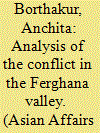

|
|
|
|
|
| Summary/Abstract |
The Ferghana valley which is an ethnically and culturally complex region divided among three Central Asian Republics of Kyrgyzstan, Tajikistan and Uzbekistan, witnessed a number of problems ranging from inter- ethnic tensions to border incursions; from security related complications to a number of socio- economic difficulties in the recent years. Moreover, it is also the most densely populated areas in Central Asia. Though sometimes the threat of religious extremism and intolerance in the Ferghana valley has been exaggerated yet it is difficult to completely deny their presence in the region and the obvious threat it has been posing for the entire Central Asia in future. The artificial delineation of border in the Ferghana valley which was finalized during the soviet era can be considered as one of the principle reasons behind the occurrences of various conflicts in the valley especially after the disintegration of the Soviet Union. Similarly, economy also plays a pivotal role in accentuating the conflict in the region as it is found that the root cause of majority of the conflicts prevalent in the region are regarding the domination of a particular ethnic group on the economic resources of that very area. However, the rivalry between the elites of the three republics and their struggle for power also play a prominent role in the disturbances that has been taking place in Ferghana valley as the elites of the valley do not want to lose their predominant position in the newly formed political establishments of their respective republics.
|
|
|
|
|
|
|
|
|
|
|
|
|
|
|
|
| 2 |
ID:
153006
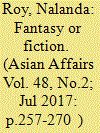

|
|
|
|
|
| Summary/Abstract |
This article looks at the South China Sea dispute and its impact in international relations. It analyses why the Southeast Asian states are highly sovereignty sensitive, and how such sensitivity has made non-intervention the bedrock of managing their foreign policies. China has long viewed the near seas as regions of geostrategic interest, and thus the SCS is not an exception. On the one hand it brings hope and prosperity, and on the other uncertainty and threat. At the end, the article argues whether China’s assertive position regarding other countries’ sovereignty claims in the Arctic might undermine its own position in contested areas like the SCS, and suggests that China will at least have to learn how to share and bear (term coined by the author) as a member of the international community.
|
|
|
|
|
|
|
|
|
|
|
|
|
|
|
|
| 3 |
ID:
153009


|
|
|
|
|
| Summary/Abstract |
Traditionally seen as a President consumed by the war on terror, George W. Bush is frequently portrayed as being relatively uninterested in Asia, and unable to outline a vision or a strategy to China, America’s Asian allies and Asian multilateral mechanisms. This article will revisit Bush’s policy on Asia and show a president who guided the United States with a policy that balanced the need to combat global terrorism and locate a focus on Asia. He faced the dilemmas of building cooperative relations with a rising China while trying to foster American alliances and partnerships in Asia, and managing the wars in Afghanistan and Iraq. Utilizing qualitative content analysis as the main research method, the article will demonstrate that the Bush administration had not a lack of focus on Asia and that Bush’s diplomacy to Asia should be recognized as one of the most significant achievements of his presidency.
|
|
|
|
|
|
|
|
|
|
|
|
|
|
|
|
| 4 |
ID:
153004
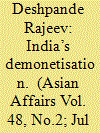

|
|
|
|
|
| Summary/Abstract |
This article offers an account of the impact of Indian PM Narendra Modi’s decision in November 2016 to withdraw suddenly all Rs 500 and Rs 1000 notes from circulation in India with the avowed intent of combatting fraud, tax avoidance and other economic problems. The article assesses the impact from the demonetisation in November to the March 2017 Indian regional elections, where wide-scale victories for Modi’s political party, the BJP, appear to have vindicated his reforms. The article provides an analysis of the political background of the period, as well as looking at the economic and societal impact of the changes, including the way in which the behaviour of Indian citizens has been ‘nudged’ with particular regard to use of banking, transactions, social effects, and payment of tax.
|
|
|
|
|
|
|
|
|
|
|
|
|
|
|
|
| 5 |
ID:
153008
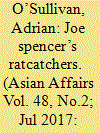

|
|
|
|
|
| Summary/Abstract |
During the Anglo-Soviet occupation of Persia (Iran), the Tehran-based Defence Security Office was responsible for protecting from Nazi subversion and sabotage three potential strategic targets: the vital oilfields, pipelines, and refineries of Khuzistan; the Lend-Lease supply route between the Persian Gulf and the Soviet Union; and the security of the Persian polity itself. Against all odds, under the command of Lt Col E.L. ‘Joe’ Spencer, this small but effective British/Indian security-intelligence unit succeeded in neutralising the Nazi threat, in capturing all German operatives on Persian soil, and in maintaining the security of a territory five times the size of Britain.
|
|
|
|
|
|
|
|
|
|
|
|
|
|
|
|
| 6 |
ID:
153005
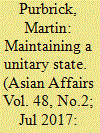

|
|
|
|
|
| Summary/Abstract |
This essay reviews the history of Uighur related terrorism in Xinjiang as well as elsewhere in China and discusses the political motivations and effectiveness of the Chinese government in suppressing terrorism. The essay assesses both the motivations of the Uighurs engaged in terrorism, as well as the motivations for counter terrorist by the Chinese authorities. A key objective of the essay is to determine what are the political and other reasons that drive the Chinese government’s counter terrorism strategy and tactics and whether these have been effective or counter-productive. The essay assesses the counter terrorism strategy of the Chinese government in Xinjiang Province and across China, the political motivations for the strategy, the impact and success or otherwise. The essay discusses if the government is combatting terrorism, or separatism, or extremism, the confusion of these terms, and whether this has had any impact on the effectiveness of counter terrorism.
|
|
|
|
|
|
|
|
|
|
|
|
|
|
|
|
| 7 |
ID:
153007
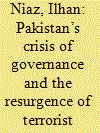

|
|
|
|
|
| Summary/Abstract |
Fifteen years since joining the US-led anti-terrorism coalition, Pakistan’s response to the challenges of terroristic violence and extremist indoctrination and propaganda remain military-centric and kinetic. Since August 2016, after a brief lull, Pakistan has experienced a resurgence of terrorist activity and violence that has struck all of its provinces and placed its capital on high alert. The re-escalation in the level of terrorist violence began with the August 8, 2016, attacks in Quetta, which left over 70 dead and more than 100 injured. The lack of response from the provincial and federal governments to this carnage, led the Supreme Court of Pakistan to exercise its authority under Article 184(3) of the Constitution and establish an Inquiry Commission to examine the state of the investigation and report on the challenges faced in the struggle against terrorism and extremism. This inquiry assumed the form and substance of an audit of the performance of Pakistan’s institutions and exposed the link between the country’s crisis of governance and its incoherent response to terrorism and extremism at all levels of government. The implications of the inquiry report are both broad and deep, and reveal that Pakistan’s trajectory remains that of civilian administrative breakdown and institutional exhaustion. This indicates that Pakistan’s civilian-military balance continues to shift in structural terms in favour of the latter and that beneath a veneer of constitutional democracy, the arbitrary, unwise, and inefficient, exercise of power by the political class continues to hollow out the country’s administrative institutions.
|
|
|
|
|
|
|
|
|
|
|
|
|
|
|
|
|
|
|
|
|